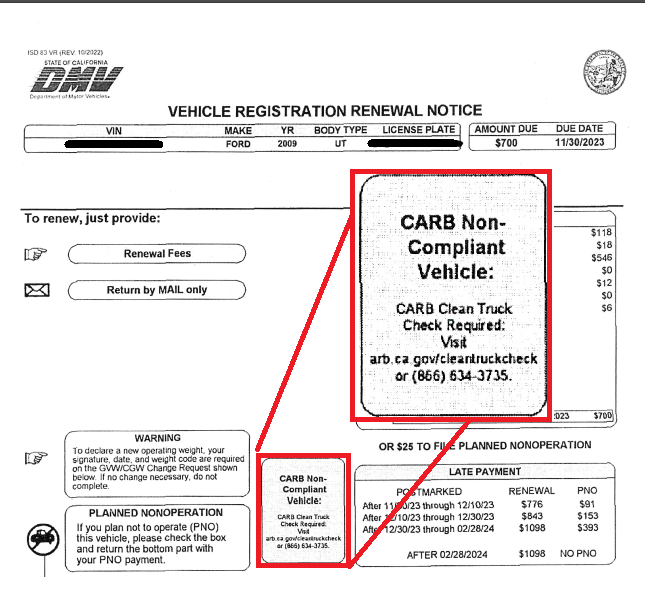
DMV Compliance Verification | TruckStop
Contact
Esta página está disponible en español.
If you have a 2009-2011 vehicle that includes a CARB Non-Compliant Vehicle Warning warning on the DMV registration renewal notice, contact CARB before renewing. Vehicles not compliant with the Truck and Bus regulation cannot be operated in California regardless of their registration status with DMV.
Frequently Asked Questions | Español


Background
As of January 1, 2020, the California Air Resources Board’s (CARB) Truck and Bus Regulation (Regulation) is enforced through an automatic process. Legislation passed in 2017, requires that the California Department of Motor Vehicles (DMV) check that vehicles are compliant with, or exempt from, the Regulation. If a vehicle is not compliant with the rule, DMV can no longer register that vehicle. The DMV compliance verification process will better enforce the regulation and level the playing field for businesses throughout California.
If a vehicle is not compliant with the rule, DMV will no longer register that vehicle.
Frequently Asked Questions | Español
Regulation Program
Regulation Basics
To view the regulation basics, visit TruckStop: Truck and Bug Regulation Requirements.
Flexibility Options
To view flexibility options, visit TruckStop: Truck and Bus Regulation Flexibility Options.
Extensions
If a vehicle is not compliant, the vehicle owner may be able to pay the registration fee to receive a 90-day Temporary Operating Permit (TOP) from DMV. The 90-day period starts on the day the current vehicle registration expires. While the vehicle owner can drive during this period, the vehicle is still not compliant with CARB’s Truck & Bus Regulation and could still be cited. The TOP is not a compliance extension.
The Truck and Bus Regulation is California law. CARB’s staff, management, executive officers, and board members are all bound by the requirements of the regulation and do not have the authority to offer any additional extensions or exceptions not already provided for in the law.
If a vehicle owner has a vehicle that must be replaced or upgraded to meet Truck and Bus regulatory requirements, and the vehicle owner has purchased the necessary replacement or upgrade, the manufacturer delay extension specified in section 2025(p)(8) of the regulation allows the vehicle owner to continue to use the existing vehicle if the replacement or upgrade is unavailable due to a manufacturer delay. You must have purchased the replacement engine or replacement vehicle on or before September 1 before the initial compliance date for the existing vehicle that is to be replaced or upgraded. If the delivery of a replacement vehicle (or replacement engine) is delayed by the manufacturer, then the vehicle owner may continue to operate temporarily the existing vehicle that is to be replaced until the replacement vehicle or engine is delivered. During the open reporting period in January, you must meet the applicable reporting and record keeping requirements of sections 2025(r) and (s) of the regulation and submit proof of the purchase to use the extension. The vehicle owner cannot continue to operate the existing non-compliant vehicle once the replacement vehicle is delivered.
Selling Non-Compliant Vehicles
If you plan to sell a non-compliant vehicle subject to the regulation, you must provide a specific disclosure statement in writing to the buyer on the bill of sale, sales contract addendum, or invoice regarding the Truck & Bus Regulation. The rules do not cover selling a non-compliant vehicle out-of-state.
Funding Options
Excluded Vehicles
Some vehicles will be difficult for the DMV to identify as compliant with the Regulation. CARB has developed the Excluded Diesel Vehicle Reporting (EDVR) System as a tool to assist vehicle owners who have had (or will have) their DMV vehicle registration denied inadvertently.
Special reporting may be required for vehicles converted from diesel to other fuels such as gasoline or dedicated natural gas, snow removal vehicles, personal use motor homes or recreational vehicles and personal use pickups (14,001-19,500 lbs. GVWR). In addition, while the model year of the vehicle may not meet the DMV Truck and Bus Regulation compliance verification requirement, the vehicle’s EMY may meet the regulatory requirements. Therefore, the engine may be compliant and you will need to provide additional information to CARB
Excluded Diesel Vehicle Reporting (EDVR)
Submitting documentation that is complete, legible, and accurate at least a month before your registration due date is the best way to avoid the need to pay a fee to DMV for a temporary registration permit. Submitting documentation that is incomplete, illegible, and/or inaccurate will result in this form being rejected. 13 CCR § 2025(z) states: “Any person…who knowingly submits any false statement or representation in any application, report, statement, or other document filed, maintained, or used for the purposes of compliance with this regulation may be subject to civil or criminal penalties under sections 39674, 39675, 42400, 42400.1, 42400.2, 42402.2, and 43016, of the Health and Safety Code.
Regulation Timeline
| 2020 | 2021 | 2022 | 2023 |
|---|---|---|---|
|
|
|
|
